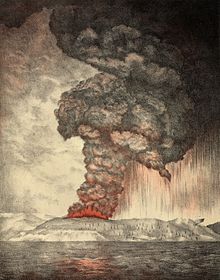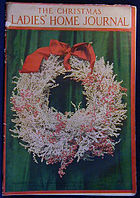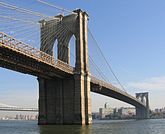
1883
Related subjects: Years
Background to the schools Wikipedia
This content from Wikipedia has been selected by SOS Children for suitability in schools around the world. SOS Children works in 45 African countries; can you help a child in Africa?
| Millennium: | 2nd millennium |
|---|---|
| Centuries: | 18th century – 19th century – 20th century |
| Decades: | 1850s 1860s 1870s – 1880s – 1890s 1900s 1910s |
| Years: | 1880 1881 1882 – 1883 – 1884 1885 1886 |
| 1883 in topic: |
| Humanities |
| Archaeology – Architecture – Art – Literature – Music |
| By country |
| Australia – Canada – France – Germany – Mexico – Philippines – South Africa – US – UK |
| Other topics |
| Rail Transport – Science – Sports |
| Lists of leaders |
| Colonial Governors – State leaders |
| Birth and death categories |
| Births – Deaths |
| Establishments and disestablishments categories |
| Establishments – Disestablishments |
| Works category |
| Works |
| Gregorian calendar | 1883 MDCCCLXXXIII |
| Ab urbe condita | 2636 |
| Armenian calendar | 1332 ԹՎ ՌՅԼԲ |
| Assyrian calendar | 6633 |
| Bahá'í calendar | 39–40 |
| Bengali calendar | 1290 |
| Berber calendar | 2833 |
| British Regnal year | 46 Vict. 1 – 47 Vict. 1 |
| Buddhist calendar | 2427 |
| Burmese calendar | 1245 |
| Byzantine calendar | 7391–7392 |
| Chinese calendar | 壬午年十一月廿三日 (4519/4579-11-23) — to — 癸未年十二月初三日(4520/4580-12-3) |
| Coptic calendar | 1599–1600 |
| Ethiopian calendar | 1875–1876 |
| Hebrew calendar | 5643–5644 |
| Hindu calendars | |
| - Vikram Samvat | 1939–1940 |
| - Shaka Samvat | 1805–1806 |
| - Kali Yuga | 4984–4985 |
| Holocene calendar | 11883 |
| Igbo calendar | |
| - Ǹrí Ìgbò | 883–884 |
| Iranian calendar | 1261–1262 |
| Islamic calendar | 1300–1301 |
| Japanese calendar | Meiji 16 (明治16年) |
| Juche calendar | N/A (before 1912) |
| Julian calendar | Gregorian minus 12 days |
| Korean calendar | 4216 |
| Minguo calendar | 29 before ROC 民前29年 |
| Thai solar calendar | 2426 |
Year 1883 (MDCCCLXXXIII) was a common year starting on Monday (link will display the full calendar) of the Gregorian calendar and a common year starting on Saturday of the 12-day slower Julian calendar.
Events
January–March
- January 4 – Life magazine is founded in New York City.
- January 10 – A fire at the Newhall Hotel in Milwaukee kills 73 people.
- January 16 – The Pendleton Civil Service Reform Act, establishing the United States civil service, is passed.
- January 19 – The first electric lighting system employing overhead wires begins service in Roselle, New Jersey (it was built by Thomas Edison).
- February 13 – The German composer Richard Wagner dies of a heart attack in Venice, Italy.
- February 16 – The Ladies Home Journal is published for the first time.
- February 23 – Alabama becomes the first U.S. state to enact an antitrust law.
- February 28 – The first vaudeville theatre is opened, in Boston, Massachusetts.
- March 2 – The Hong Kong Observatory is formed.
- March 5 – The Gloucester City A.F.C. is formed.
- March 20 – Paris Convention for the Protection of Industrial Property.
April–June
- April 5 – Oxygen is liquefied for the very first time.
- May 5 – Construction of the Swanage Railway begins.
- May 24 – Brooklyn Bridge is opened to traffic after 13 years of construction.
- May 30 – In New York City, a rumor that the Brooklyn Bridge is going to collapse causes a stampede which crushes 12 people.
- June 16 – Victoria Hall disaster: A rush for treats results in 183 children being asphyxiated in a concert hall in Sunderland, England.
- June 28 – In Milan, Italy the first central European electricity power station is inaugurated.
- June 30 – The Black Arrow by Robert Louis Stevenson first appears as a serial in Young Folks; A Boys' and Girls' Paper of Instructive and Entertaining Literature. Stevenson completes the novel at the end of summer in France.
July–September
- July 3 – The SS Daphne disaster in Glasgow leaves 124 dead.
- July 4 – The world's first rodeo is held in Pecos, Texas.
- July 22 – Zulu King Cetshwayo barely escapes a rebel attack with his life.
- August – King William's College is opened on the Isle of Man.
- August 12 – The last quagga dies at the Artis Magistra zoo in Amsterdam.
- August 21 – An F5 tornado strikes Rochester, Minnesota, leading to the creation of the Mayo Clinic.
- August 26– August 28 – Krakatoa or Krakatau volcano erupts at 10:02 AM (local time); 163 villages are destroyed, 36,380 killed.
- September 11 – Major Evelyn Baring becomes Consul-General of Egypt under British rule.
- September 15
- The Bombay Natural History Society is founded.
- The University of Texas at Austin opens to students.
- September 29 – A consortium of flour mill operators in Minneapolis, Minnesota forms the Minneapolis, Sault Ste. Marie and Atlantic Railway as a means to get their product to the Great Lakes ports but avoid the high tariffs of Chicago.

An 1888 lithograph of the 1883 eruption of Krakatoa.
October–December
- October 1 – Sydney Boys High School (the first boys' public school) is founded in Sydney, Australia.
- October 4
- The Boys' Brigade (the first uniformed youth organization in existence) is founded in Glasgow, Scotland.
- The Orient Express begins operation.
- October 15 – The Supreme Court of the United States declares part of the Civil Rights Act of 1875 to be unconstitutional, allowing individuals and corporations to discriminate based on race.
- October 20 – Peru and Chile sign the Treaty of Ancón, by which the Tarapacá province is ceded to Chile, ending Peru's involvement in the War of the Pacific.
- October 24 – Cardiff University, Wales, opens (under the name of University College of South Wales and Monmouthshire).
- October 30 – Two Clan na Gael dynamite bombs explode in the London underground, injuring several people. The next day, Home Secretary Vernon Harcourt drafts 300 policemen to guard the underground and introduces the Explosives Bill.
- November 1 – Amsterdam: The first international colonial and export exhibition closes, having had over 1 million visitors.
- November 3 – American Old West: Self-described " Black Bart the Po-8" makes his last stagecoach robbery, but leaves a handkerchief with a laundry mark that eventually leads to his capture.
- November 14 – Chile's National Library of Congress is founded.
- November 18 – U.S. and Canadian railroads institute 5 standard continental time zones, ending the confusion of thousands of local times.
- November 28 – Whitman College is chartered as a 4-year college in Walla Walla, Washington.
- December 5 Five people are killed in the Bisbee Massacre, the robbery of a general store by bandits in Bisbee, Arizona.
Date unknown
- German bacteriologist Robert Koch discovers the cholera bacillus.
- Antoni Gaudí begins to work on the Sagrada Família Cathedral in Barcelona (it will be consecrated in 2010).
- Duncan, Arizona, is founded.
- The suburb of Ingleburn, in Sydney, Australia, is established.
- During construction of the Canadian Pacific Railway in 1883, blasting and excavation reveal high concentrations of nickel–copper ore at Murray Mine on the edge of the Sudbury Basin located near Sudbury, Ontario, Canada.
- Otto von Bismarck pushes the first social security law through the Reichstag.
- A depression starts in Seattle, United States.
- The British Parliament considers a major bill to allow Indian judges to try Europeans in India. The British community rises in protest and defeats the measure.
- Bernard Kroger establishes the first Kroger grocery store, in Cincinnati, Ohio.
- The first Carnegie library is opened in Andrew Carnegie's hometown, Dunfermline, Scotland.
- The Adventures of Pinocchio by Carlo Collodi is first published complete in book form in Italy.
- The Wolf's Head Society (known as The Third Society until 1888) is founded at Yale University.
- The Mexican government passes a law allowing real estate companies (controlled by General Porfirio Díaz's political associates) to survey public and "vacant" lands and to retain one third of the land they survey.
- Founding of:
- Houghton College
- Wagner College
- Baltimore Polytechnic Institute
- Footscray Football Club (now the Western Bulldogs).
- Raith Rovers Football Club
- The Black Arabs F.C (now Bristol Rovers)
- Dunstable Town F.C.
Births
January–March
- January 1
- January 3 – Clement Attlee, Prime Minister of the United Kingdom (d. 1967)
- January 5 – Döme Sztójay, prime minister of Hungary (d. 1946)
- January 6 – Khalil Gibran, Lebanese poet, painter, and novelist (d. 1931)
- January 10
- Florence Reed, American actress (d. 1967)
- Hubert Latham, pioneer aviator of the pre-World War I era (d. 1912)
- Francis X. Bushman, American actor (d. 1966)
- Aleksei Nikolaevich Tolstoi, Russian writer (d. 1945)
- January 16 – Hugh Oswald Short, British aviation pioneer and aircraft builder, youngest of the Short Brothers (d. 1969)
- January 20 – Bertram Ramsay, British admiral (d. 1945)
- January 21 – Olav Aukrust, Norwegian poet (d. 1929)
- January 30 – Eddie Collins, American vaudeville-veteran comic (d. 1940)
- February 8 – Joseph Alois Schumpeter, Austrian economist (d. 1950)
- February 9 – Fritz August Breuhaus de Groot, German architect, interior designer and designer (d. 1960)
- February 15 – Sax Rohmer, English author (d. 1959)
- February 16 – Elizabeth Craig, British writer (d. 1980)
- February 18 – Nikos Kazantzakis, Greek poet (d. 1957)
- February 22
- February 23 – Karl Jaspers, German philosopher (d. 1969)
- March 3 – Cyril Burt, educational psychologist (d. 1971)
- March 4 – Sam Langford, Canadian boxer (d. 1956)
- March 19
- Walter Haworth, British chemist, Nobel Prize laureate (d. 1950)
- Joseph Stilwell, American soldier (d. 1946)
April–June
- April 1 – Lon Chaney, Sr., American actor (d. 1930)
- April 12 – Dally Messenger, Australian rugby league player (d. 1959)
- April 15 – Stanley Bruce, eighth Prime Minister of Australia (d. 1967)
- April 27 – Hubert Harrison, African American writer, critic, and activist (d. 1927)
- April 30 – Jaroslav Hašek, Czech writer (d. 1923)
- May 1 – Tom Moore, Irish-American actor (d. 1955)
- May 5 – Archibald Wavell, 1st Earl Wavell, British field marshal (d. 1950)
- May 9 – José Ortega y Gasset, Spanish philosopher (d. 1955)
- May 10 – Eugen Levine, Communist leader of the Munich Soviet Republic (d. 1919)
- May 16 – Celal Bayar, Turkish politician, statesman and the third President of Turkey (d. 1986)
- May 18 – Walter Gropius, German architect (d. 1969)
- May 20 – King Faisal I of Iraq (d. 1933)
- May 23
- May 24 – Elsa Maxwell, American gossip columnist and international party giver (d. 1963)
- May 25 – Lesley J. McNair, American general (d. 1944)
- May 26 – Mamie Smith, American Vaudeville singer (d. 1943)
- May 31 – Lauri Kristian Relander, President of Finland (d. 1942)
- June 5 – John Maynard Keynes, English economist (d. 1946)
- June 7 – Sylvanus G. Morley, American scholar and World War I spy (d. 1948)
- June 18 – Mary Alden, American stage & screen actress (d. 1946)
- June 21 – Lluís Companys i Jover, President of Catalonia (d. 1940)
- June 24 – Victor Franz Hess, Austrian-born physicist, Nobel Prize laureate (d. 1964)
- June 28 – Pierre Laval, Prime Minister of France (d. 1945)
- June 29 – Lothrop Stoddard, American eugenicist and Radical scientific racist (d. 1950)
July–September
- July 1 – Arthur Borton, English soldier (d. 1933)
- July 3 – Franz Kafka, Austrian writer (d. 1924)
- July 4 – Rube Goldberg, American cartoonist (d. 1970)
- July 10 – Johannes Blaskowitz, German general (d. 1948)
- July 16 – Charles Sheeler, American photographer and artist (d. 1965)
- July 19 – Max Fleischer, Austrian animator and film producer ( Betty Boop) (d. 1972)
- July 25 – Alfredo Casella, Italian composer (d. 1947)
- July 26 – Edwin Balmer, American science fiction and mystery writer (d. 1959)
- July 28 – Angela Hitler, Austrian elder half-sister of Adolf Hitler (d. 1949)
- July 29
- Porfirio Barba-Jacob, Colombian writer (d. 1942)
- Benito Mussolini, dictator of Italy (d. 1945)
- August 9 – Chester Gillette, American murderer (d. 1908 by execution)
- August 12 – Pauline Frederick, American stage and screen actress, (d. 1938)
- August 15 – Ivan Meštrović, Croatian sculptor and architect, (d. 1962)
- August 19
- August 23
- August 30 – Theo van Doesburg, Dutch artist, painter, architect, and poet (d. 1931)
- September 13 – August Zaleski, former President of Poland (d. 1972)
- September 14 – Gadicharla Harisarvothama Rao, one of the foremost freedom fighters of India (d. 1960)
- September 15 – Esteban Terradas i Illa, Catalan mathematician, scientist, and engineer (d. 1950)
- September 22 – Ferenc Oslay, Hungarian- Slovene historian, writer and irredenta (d. 1932)
October–December
- October 8 – Otto Heinrich Warburg, German physician and physiologist, Nobel Prize laureate (d. 1970)
- October 15 – Robert L. Ghormley, American admiral (d. 1958)
- October 26 – Paul Pilgrim, American athlete (d. 1958)
- October 30 – Bob Jones Sr, American evangelist, pioneer religious broadcaster, and founder and first president of Bob Jones University (d. 1968)
- November 4 – Nikolaos Plastiras, Greek general and politician (d. 1953)
- November 8 – Arnold Bax, English composer (d. 1953)
- November 9 – Edna May Oliver, stage & film character actress (d. 1942)
- November 11 – Ernest Ansermet, Swiss conductor (d. 1969)
- November 18 – Carl Vinson, U.S. Congressman (d. 1981)
- November 25
- December 3 – Anton Webern, Austrian composer (d. 1945)
- December 12 – Cliff Sterrett, American cartoonist (d. 1964)
- December 13 – Belle da Costa Greene, American librarian, bibliographer, and archivist (d. 1950)
- December 14 – Morihei Ueshiba, Japanese martial artist and founder of aikido (d. 1969)
- December 16
- December 17 – Raimu, French actor (d. 1946)
- December 22
- December 25 – Hugo Bergmann, German and Israeli Jewish philosopher (d. 1975)
- December 26 – Maurice Utrillo, French artist and illustrator (d. 1955)
- December 29 – Forrest Taylor, American stage, film and television actor (d. 1965)
Date unknown
Deaths
January–June
- January 8
- January 10
- January 23 – Gustave Doré, French artist (b. 1832)
- January 24 – Friedrich von Flotow, German composer (b. 1812)
- February 13 – Richard Wagner, German composer (b. 1813)
- February 15 – Prince Kwacho Hiroatsu of Japan (b. 1875)
- February 17
- March 14 – Karl Marx, German communist philosopher (b. 1818)
- March 20 – Charles Lasègue, French physician (b. 1816)
- March 21 – Grigol Orbeliani, Georgian poet and soldier (b. 1804)
- March 28 – Napoleon Bonaparte Buford, American general and railroad executive (b. 1807)
- April 4 – Peter Cooper, American industrialist, inventor and philanthropist (b. 1791)
- April 16 – Charles II, Duke of Parma (b. 1799)
- April 26 – Napoleon Orda, Belarussian composer and artist (b. 1807)
- April 30 – Édouard Manet, French painter (b. 1832)
- May 15 – Keelikolani, princess of Hawaii (b. 1826)
- May 26
- June 20 – John William Colenso, Bishop of Natal (b. 1814)
July–December
- July 22 – Edward Ord, U.S. Army officer (b. 1818)
- July 27 – Montgomery Blair, American politician (b. 1813)
- August 24 – Henry, Count of Chambord, pretender to the French throne (b. 1820)
- September 3 – Ivan Turgenev, Russian writer (b. 1818)
- September 10 – Otto Pius Hippius, Baltic German architect (b. 1826)
- October 5 – Joachim Barrande, French palaeontologist (b. 1799)
- October 14 – Sir Arthur Elton, 7th Baronet, writer and Liberal Party politician (b. 1818)
- October 22 – Thomas Mayne Reid, Irish-American novelist (b. 1818)
- October 30 – Robert Volkmann, German composer (b. 1815)
- December 13 – Victor de Laprade, French poet and critic (b. 1812)
- December 27 – Andrew A. Humphreys, American general and civil engineer (b. 1810)


